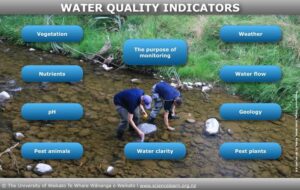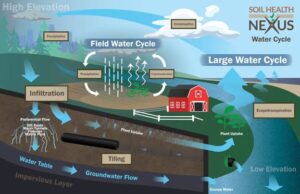Back to: Botany 500 Level
My Afrilearn champion, how you dey today?
I trust say your brain dey spark like NEPA light! Today’s gist na something very important for both farmers and scientists—Soil and Water Quality Monitoring. This one na key topic wey help us understand the health of our land and water. And you know say for any country wey wan chop better and stay healthy, we gats take care of both soil and water. So make we yan as per sharp guy or babe wey wan sabi ecology well-well.
Soil and water quality monitoring
Wetin Be Soil and Water Quality Monitoring?
Simply put, soil and water quality monitoring na the regular checking of soil and water to know if dem still dey healthy or if something don spoil. Think of it like going for check-up with your doctor—na the same way scientists dey do check-up for land and water.

When we talk of quality, we dey ask questions like:
- Is the water clean enough for plants, animals, and humans?
- Is the soil rich enough to support farming or forest growth?
- Are there dangerous chemicals wey don enter the soil or water?
Why Is Monitoring Important?
- For Agriculture: If soil no get correct nutrients, crops no go grow well. Same thing for water—dirty water fit kill crops or spread diseases.
- For Environment: Healthy soil and water help plants grow, and support animals and even humans.
- For Prevention: Monitoring helps us notice small problems before dem become big wahala like erosion, land degradation, or pollution.
How Do We Monitor Soil Quality?
Soil quality monitoring involves checking different things:
- Soil pH: This tells us if the soil is acidic, neutral, or alkaline. Most crops prefer slightly acidic to neutral soil (around pH 6–7).
Example: If cassava no dey grow well on your farm, maybe the soil don too acidic because of overuse of fertiliser. - Nutrient Levels: Testing for nitrogen, phosphorus, and potassium (NPK) shows how fertile the soil is.
Example: A tomato farm wey no get enough potassium go get fruits wey small and dull. - Soil Texture and Structure: Is it sandy, loamy, or clayey? This affects how water moves in the soil and how roots can grow.
- Organic Matter: This is the “life” in the soil—dead leaves, compost, or manure that helps the soil breathe and support crops.
How Do We Monitor Water Quality?
Water quality testing focuses on:
- pH level: Just like soil, water can be too acidic or too alkaline. Ideal drinking or irrigation water should be around pH 6.5–8.5.
- Dissolved Oxygen: Water needs oxygen for fish and plants to survive.
- Temperature: Affects how much oxygen water can hold and how fast organisms grow.
- Turbidity: If water too dirty or muddy, light no go pass through well, and this can affect aquatic life.
- Contaminants: We check for harmful things like heavy metals (e.g. lead, mercury), pesticides, or bacteria like E. coli.

Real-Life Example:
In the Niger Delta, oil spills don affect soil and water. Scientists monitor the water and soil quality in those areas to check the level of pollution and to know how to clean it up.
Tools We Use
- Soil Test Kits: For farmers or students to quickly check pH and NPK levels.
- Water Test Kits: For checking pH, turbidity, and pollutants.
- Sensors and Probes: More advanced tools used in labs or by professionals.
- Field Notebooks & GPS: To record where samples were taken and under what conditions.
Summary:
- Soil and water quality monitoring helps check the health of land and water.
- Soil tests include pH, nutrients, organic matter, and texture.
- Water tests check pH, temperature, oxygen, turbidity, and contaminants.
- Monitoring helps protect crops, human health, and the environment.
Evaluation:
- Why is it important to monitor soil pH before planting crops?
- What does high turbidity in water mean, and why is it a concern?
- Mention three things that can be tested to determine soil quality.
You dey try well-well, my Afrilearn superstar!
See as you dey understand the real work of environmental scientists! With this knowledge, you fit help farmers, save nature, and even work with big organisations wey dey fight pollution. Your future dey bright like Lagos sun—so keep your head high and your heart ready to learn more. You are unstoppable, and Afrilearn dey your corner always!
